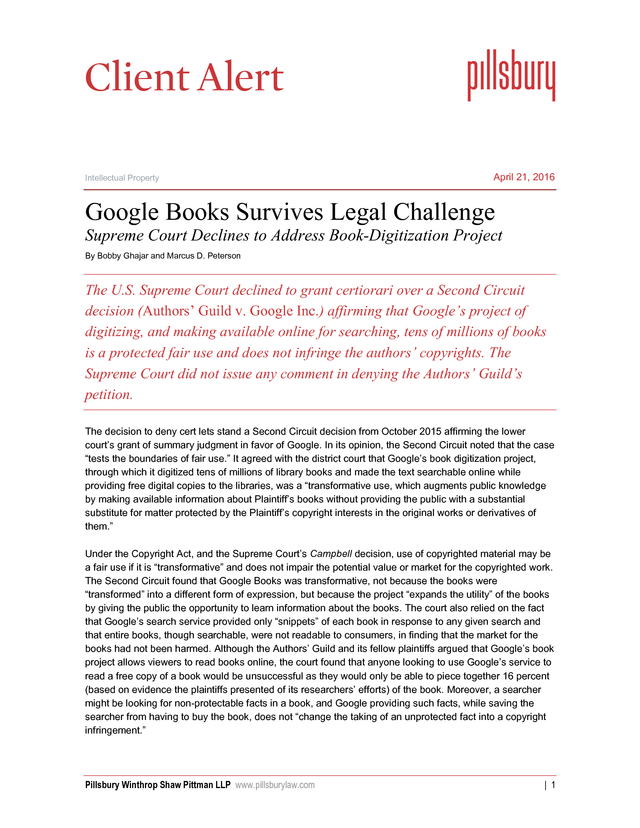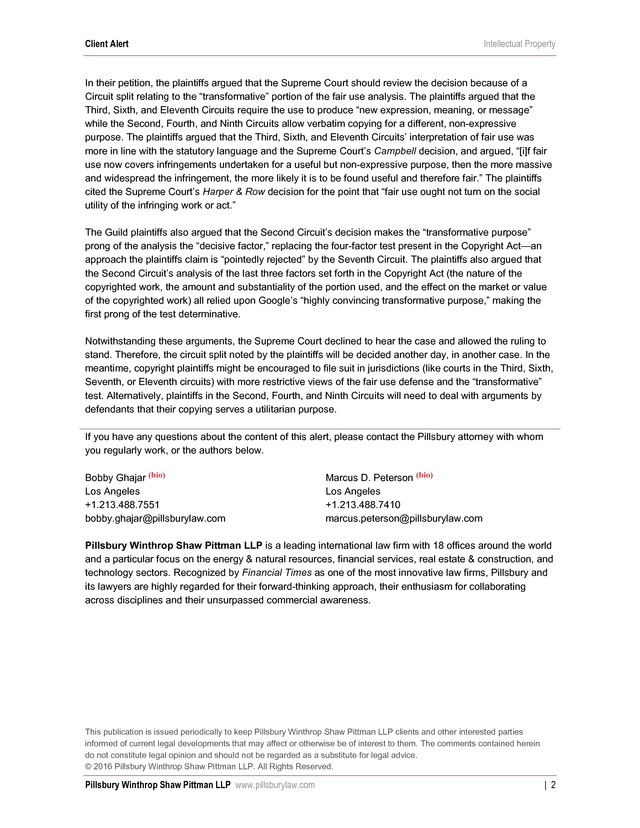Description
Client Alert
Client Alert
Intellectual Property
Intellectual Property
April 21, 2016
Google Books Survives Legal Challenge
Supreme Court Declines to Address Book-Digitization Project
By Bobby Ghajar and Marcus D. Peterson
The U.S. Supreme Court declined to grant certiorari over a Second Circuit
decision (Authors’ Guild v. Google Inc.) affirming that Google’s project of
digitizing, and making available online for searching, tens of millions of books
is a protected fair use and does not infringe the authors’ copyrights.
The Supreme Court did not issue any comment in denying the Authors’ Guild’s petition. The decision to deny cert lets stand a Second Circuit decision from October 2015 affirming the lower court’s grant of summary judgment in favor of Google. In its opinion, the Second Circuit noted that the case “tests the boundaries of fair use.” It agreed with the district court that Google’s book digitization project, through which it digitized tens of millions of library books and made the text searchable online while providing free digital copies to the libraries, was a “transformative use, which augments public knowledge by making available information about Plaintiff’s books without providing the public with a substantial substitute for matter protected by the Plaintiff’s copyright interests in the original works or derivatives of them.” Under the Copyright Act, and the Supreme Court’s Campbell decision, use of copyrighted material may be a fair use if it is “transformative” and does not impair the potential value or market for the copyrighted work. The Second Circuit found that Google Books was transformative, not because the books were “transformed” into a different form of expression, but because the project “expands the utility” of the books by giving the public the opportunity to learn information about the books. The court also relied on the fact that Google’s search service provided only “snippets” of each book in response to any given search and that entire books, though searchable, were not readable to consumers, in finding that the market for the books had not been harmed.
Although the Authors’ Guild and its fellow plaintiffs argued that Google’s book project allows viewers to read books online, the court found that anyone looking to use Google’s service to read a free copy of a book would be unsuccessful as they would only be able to piece together 16 percent (based on evidence the plaintiffs presented of its researchers’ efforts) of the book. Moreover, a searcher might be looking for non-protectable facts in a book, and Google providing such facts, while saving the searcher from having to buy the book, does not “change the taking of an unprotected fact into a copyright infringement.” Pillsbury Winthrop Shaw Pittman LLP www.pillsburylaw.com | 1 . Client Alert Intellectual Property In their petition, the plaintiffs argued that the Supreme Court should review the decision because of a Circuit split relating to the “transformative” portion of the fair use analysis. The plaintiffs argued that the Third, Sixth, and Eleventh Circuits require the use to produce “new expression, meaning, or message” while the Second, Fourth, and Ninth Circuits allow verbatim copying for a different, non-expressive purpose. The plaintiffs argued that the Third, Sixth, and Eleventh Circuits’ interpretation of fair use was more in line with the statutory language and the Supreme Court’s Campbell decision, and argued, “[i]f fair use now covers infringements undertaken for a useful but non-expressive purpose, then the more massive and widespread the infringement, the more likely it is to be found useful and therefore fair.” The plaintiffs cited the Supreme Court’s Harper & Row decision for the point that “fair use ought not turn on the social utility of the infringing work or act.” The Guild plaintiffs also argued that the Second Circuit’s decision makes the “transformative purpose” prong of the analysis the “decisive factor,” replacing the four-factor test present in the Copyright Act—an approach the plaintiffs claim is “pointedly rejected” by the Seventh Circuit. The plaintiffs also argued that the Second Circuit’s analysis of the last three factors set forth in the Copyright Act (the nature of the copyrighted work, the amount and substantiality of the portion used, and the effect on the market or value of the copyrighted work) all relied upon Google’s “highly convincing transformative purpose,” making the first prong of the test determinative. Notwithstanding these arguments, the Supreme Court declined to hear the case and allowed the ruling to stand.
Therefore, the circuit split noted by the plaintiffs will be decided another day, in another case. In the meantime, copyright plaintiffs might be encouraged to file suit in jurisdictions (like courts in the Third, Sixth, Seventh, or Eleventh circuits) with more restrictive views of the fair use defense and the “transformative” test. Alternatively, plaintiffs in the Second, Fourth, and Ninth Circuits will need to deal with arguments by defendants that their copying serves a utilitarian purpose. If you have any questions about the content of this alert, please contact the Pillsbury attorney with whom you regularly work, or the authors below. Bobby Ghajar (bio) Los Angeles +1.213.488.7551 bobby.ghajar@pillsburylaw.com Marcus D.
Peterson (bio) Los Angeles +1.213.488.7410 marcus.peterson@pillsburylaw.com Pillsbury Winthrop Shaw Pittman LLP is a leading international law firm with 18 offices around the world and a particular focus on the energy & natural resources, financial services, real estate & construction, and technology sectors. Recognized by Financial Times as one of the most innovative law firms, Pillsbury and its lawyers are highly regarded for their forward-thinking approach, their enthusiasm for collaborating across disciplines and their unsurpassed commercial awareness. This publication is issued periodically to keep Pillsbury Winthrop Shaw Pittman LLP clients and other interested parties informed of current legal developments that may affect or otherwise be of interest to them. The comments contained herein do not constitute legal opinion and should not be regarded as a substitute for legal advice. © 2016 Pillsbury Winthrop Shaw Pittman LLP.
All Rights Reserved. Pillsbury Winthrop Shaw Pittman LLP www.pillsburylaw.com | 2 . .
The Supreme Court did not issue any comment in denying the Authors’ Guild’s petition. The decision to deny cert lets stand a Second Circuit decision from October 2015 affirming the lower court’s grant of summary judgment in favor of Google. In its opinion, the Second Circuit noted that the case “tests the boundaries of fair use.” It agreed with the district court that Google’s book digitization project, through which it digitized tens of millions of library books and made the text searchable online while providing free digital copies to the libraries, was a “transformative use, which augments public knowledge by making available information about Plaintiff’s books without providing the public with a substantial substitute for matter protected by the Plaintiff’s copyright interests in the original works or derivatives of them.” Under the Copyright Act, and the Supreme Court’s Campbell decision, use of copyrighted material may be a fair use if it is “transformative” and does not impair the potential value or market for the copyrighted work. The Second Circuit found that Google Books was transformative, not because the books were “transformed” into a different form of expression, but because the project “expands the utility” of the books by giving the public the opportunity to learn information about the books. The court also relied on the fact that Google’s search service provided only “snippets” of each book in response to any given search and that entire books, though searchable, were not readable to consumers, in finding that the market for the books had not been harmed.
Although the Authors’ Guild and its fellow plaintiffs argued that Google’s book project allows viewers to read books online, the court found that anyone looking to use Google’s service to read a free copy of a book would be unsuccessful as they would only be able to piece together 16 percent (based on evidence the plaintiffs presented of its researchers’ efforts) of the book. Moreover, a searcher might be looking for non-protectable facts in a book, and Google providing such facts, while saving the searcher from having to buy the book, does not “change the taking of an unprotected fact into a copyright infringement.” Pillsbury Winthrop Shaw Pittman LLP www.pillsburylaw.com | 1 . Client Alert Intellectual Property In their petition, the plaintiffs argued that the Supreme Court should review the decision because of a Circuit split relating to the “transformative” portion of the fair use analysis. The plaintiffs argued that the Third, Sixth, and Eleventh Circuits require the use to produce “new expression, meaning, or message” while the Second, Fourth, and Ninth Circuits allow verbatim copying for a different, non-expressive purpose. The plaintiffs argued that the Third, Sixth, and Eleventh Circuits’ interpretation of fair use was more in line with the statutory language and the Supreme Court’s Campbell decision, and argued, “[i]f fair use now covers infringements undertaken for a useful but non-expressive purpose, then the more massive and widespread the infringement, the more likely it is to be found useful and therefore fair.” The plaintiffs cited the Supreme Court’s Harper & Row decision for the point that “fair use ought not turn on the social utility of the infringing work or act.” The Guild plaintiffs also argued that the Second Circuit’s decision makes the “transformative purpose” prong of the analysis the “decisive factor,” replacing the four-factor test present in the Copyright Act—an approach the plaintiffs claim is “pointedly rejected” by the Seventh Circuit. The plaintiffs also argued that the Second Circuit’s analysis of the last three factors set forth in the Copyright Act (the nature of the copyrighted work, the amount and substantiality of the portion used, and the effect on the market or value of the copyrighted work) all relied upon Google’s “highly convincing transformative purpose,” making the first prong of the test determinative. Notwithstanding these arguments, the Supreme Court declined to hear the case and allowed the ruling to stand.
Therefore, the circuit split noted by the plaintiffs will be decided another day, in another case. In the meantime, copyright plaintiffs might be encouraged to file suit in jurisdictions (like courts in the Third, Sixth, Seventh, or Eleventh circuits) with more restrictive views of the fair use defense and the “transformative” test. Alternatively, plaintiffs in the Second, Fourth, and Ninth Circuits will need to deal with arguments by defendants that their copying serves a utilitarian purpose. If you have any questions about the content of this alert, please contact the Pillsbury attorney with whom you regularly work, or the authors below. Bobby Ghajar (bio) Los Angeles +1.213.488.7551 bobby.ghajar@pillsburylaw.com Marcus D.
Peterson (bio) Los Angeles +1.213.488.7410 marcus.peterson@pillsburylaw.com Pillsbury Winthrop Shaw Pittman LLP is a leading international law firm with 18 offices around the world and a particular focus on the energy & natural resources, financial services, real estate & construction, and technology sectors. Recognized by Financial Times as one of the most innovative law firms, Pillsbury and its lawyers are highly regarded for their forward-thinking approach, their enthusiasm for collaborating across disciplines and their unsurpassed commercial awareness. This publication is issued periodically to keep Pillsbury Winthrop Shaw Pittman LLP clients and other interested parties informed of current legal developments that may affect or otherwise be of interest to them. The comments contained herein do not constitute legal opinion and should not be regarded as a substitute for legal advice. © 2016 Pillsbury Winthrop Shaw Pittman LLP.
All Rights Reserved. Pillsbury Winthrop Shaw Pittman LLP www.pillsburylaw.com | 2 . .













